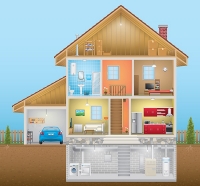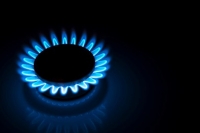Healthy Homes - Natural Gas
What is natural gas?
Natural gas is a colorless, odorless, combustible mixture of hydrocarbon gases. Natural gas provides about one-quarter of our country’s total energy consumption. Natural gas is almost pure methane when delivered to your home, school or workplace. Gas additives called mercaptans give natural gas its distinctive “rotten egg ” smell.
More than 40,000 miles of natural gas pipelines crisscross Tennessee. Wherever you live, work or play, you probably benefit from the energy products carried through these pipelines. Many people are unfamiliar with natural gas pipelines because of their strong safety record and because they are mostly underground. Sometimes natural gas pipeline incidents do occur, which can impose a risk to public health and safety.
From 2010-2012, natural gas was the fourth most commonly released chemical in Tennessee, according to our National Toxic Substance Incidents Program. About 49 percent of natural gas releases in Tennessee were due to human error and about 27 percent due to equipment failure.
The following information will help educate you about natural gas, pipelines, safety and emergency actions. Learn what to do if you suspect a gas leak.
How to detect a natural gas leak?
There are several ways to detect a natural gas leak:
Smell: The best indicator of a natural gas leak is an odor similar to rotten eggs.
Sight: Look for dirt blowing into the air, persistent bubbling in standing water or discolored or dead vegetation around a natural gas pipeline area.
Sound: Listen for an unusual hissing or roaring sound.
If you suspect a gas leak, act quickly!
Airborne natural gas can ignite easily and quickly. If you smell the “rotten egg” odor of natural gas:
- Make sure gas appliances are turned all the way OFF.
- Immediately have everyone leave the house.
- Call 911 from a neighbor's house or other location well away from the gas leak and explain the situation to authorities.
- Keep everyone away from the building until given the “all clear” from a gas company employee or other authority.
- Do not strike matches or create a flame or spark that could ignite the gas.
- Do not start an engine of any kind.
- Do not use a telephone or cell phone in the area.
- Do not flip on or off light switches, garage door openers or other electronics.
- Do not try to find the source of the natural gas leak yourself.
Other natural gas safety tips
- Gas appliances should have proper air circulation at all times.
- A gas flame should burn bright blue. A yellow or orange flame could indicate improper combustion or venting.
- Keep flammable or combustible items away from gas appliances and equipment.
- Use gas equipment only for what it was designed to do. For example, it is not safe to use a stove or range for heating a cold home.
- Buy only equipment that meets safety standards such as the American Gas Association’s Blue Star seal of approval.
- Always keep one or more fire extinguishers in your home.
- Always have a carbon monoxide detector. Click here for more information.

Call 811 before you dig
Before performing any type of home improvement project that requires digging, find out where your underground pipelines are. Be sure to call 811 before you perform any digging, even if it is planting a tree in your yard. This will allow the local utilities to come and mark the location of any underground lines to avoid damaging them when you dig. Make sure all those performing any excavation work in your neighborhood have notified 811. If a call to 811 has not been made prior to excavation, this could possibly result in damage to natural gas pipelines.

Additional resources
Tennessee Natural Gas Association
http://www.tngas.org
Call 811.
Know what’s below. Call before you dig.
http://www.call811.com
Tennessee One-Call System
http://www.tnonecall.com
